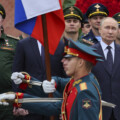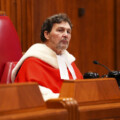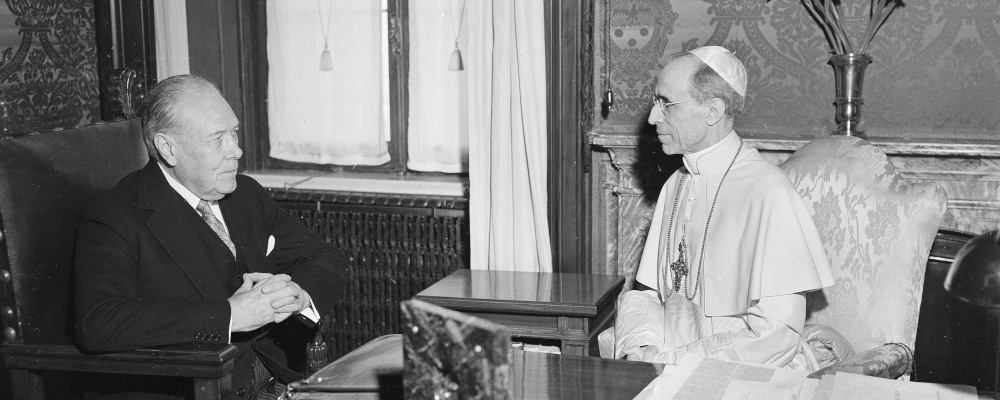The Pope at War: The Secret History of Pius XII, Mussolini, and Hitler
Author: David I. Kertzer
Publisher: Random House, New York 2022
It’s not as if the Catholic Church hasn’t enough problems to deal with. Along with the sex scandals over the last half century, Pope Francis made his way to Canada last week to help heal the wounds between the Church and Canada’s First Nations.
Now a new bookThe Pope at War: The Secret History of Pius XII, Mussolini, and Hitler https://www.penguinrandomhouse.com/books/536844/the-pope-at-war-by-david-i-kertzer/ on the never-ending debate on the role that Pope Pius XII and the Vatican played in the Holocaust during the Second World War has been released. It is unrelenting in portraying the pope’s culpability. The Catholic Church not only struggles with the present but also in a perpetual battle with the past.
The first attack on Pius XII’s reputation and role in the Holocaust started with the 1963 seven-hour play The Deputy by Rolf Hochhuth.The Deputy https://www.goodreads.com/book/show/368781.The_Deputy The play opened the door to studying the pope’s role in collaborating with Hitler and Mussolini. Over the years, several books followed, vilifying Pius XII as the most “dangerous churchman in modern history” and the accusation that he elevated Catholic self-interest over Catholic conscience. Perhaps the most damning book was the famous 1999 Hitler’s Pope by John Cornwell.Hitler’s Pope: The Secret History of Pius XII https://www.amazon.ca/Hitlers-Pope-Secret-History-Pius/dp/014311400X About nine books were published at the turn of the century on the pope’s role in the war testifying to the enduring interest in the topic.
One expert on the subject Rabbi David Dalin has done us the favour of reviewing all these books and concludes that defenders of Pius have the stronger case, that his actions were in fact more effective in saving Jewish lives.The Myth of Hitler’s Pope: Pope Pius XII And His Secret War Against Nazi Germany https://www.amazon.ca/Myth-Hitlers-Pope-Against-Germany/dp/0895260344
Then again, Pope Pius XII makes a perfect villain. He was a distant figure, unlike the warm, human types to follow, such as Pope John XXIII, the short-lived John Paul I, or Pope Francis. Pius XII, Eugenio Pacelli, was a Roman aristocrat who was most at home in high Roman society with an aesthete demeanour. He was brilliant and a hard-working bureaucrat with the look of a man who seldom asked for advice from underlings. He spoke flawless German and enjoyed the many visits he received from German soldiers stationed in Rome during the war. He served as nuncio in Bavaria and Germany from 1917 to 1929, and then as the Vatican’s Secretary of State until the College of Cardinals made him pontiff in 1939.
Now comes Professor David Kertzer, an anthropologist at Brown University with a book, The Pope at War—with access to new archival material—that tilts the debate in favour of Pius’s critics. Gary Wills, a well-respected Catholic scholar and writer, endorses Kertzer’s book by exposing the “deep slime the Vatican was wading in during Pius XII’s papacy. Brace yourself for a story full of horrors.”
Kertzer’s main arguments are that the pope was silent in denouncing Nazi atrocities, atrocities of which he was well aware, and never allowed the word “Jew” to be heard from his lips. Defenders of the pope say that verbal protests have little benefit while increasing the chances of doing more harm than good. Perhaps as Kertzer claims, the pope calculated that by 1940 the Axis looked invincible, shifting the pope’s focus on saving the church on a continent ruled by Nazis.
If that’s the case, why did Pius continue his silence even when it was clear that the Allies would prevail? Kertzer believed that the new fear was a Europe dominated by the Soviet Union and communism, which made it more important to maintain cordial relations with German authorities. Could this calculus explain the pope’s silence even as a thousand of Rome’s Jews were rounded up in October 1943 “under the Vatican’s windows” and shipped off to Auschwitz? According to Kertzer, the only Jews worth saving according to the Vatican were Jewish converts or baptized Jews.
We now know from the archives that Hitler had a secret envoy to the Vatican unknown to historians until a few years ago. He was Philipp von Hessen, a German aristocrat, a great-grandson to Queen Victoria, and married to the daughter of Italy’s King Vittorio Emmanuele. Hessen met the pope secretly, with few knowing his identity or mission. Was this a case of Hitler dominating the pope or the pope’s way of keeping his enemies closer? According to U.S. sources after the war, Hitler always distrusted the Holy See for hiding Jews.
Kertzer argues that the pope refused to speak out even after the unconscionable and vicious killing of Jews during the invasion of Poland. Kertzer argues the pope was afraid of alienating forty million Catholic Germans in a country Pacelli knew well when he served as nuncio for the Vatican throughout the 1920s. Yet the pontiff remained silent even as the Nazis killed members of the Catholic clergy in Catholic Bavaria, Poland, and Austria. Italy has been known as a country that protected about 80 percent of its Jewish population from the Nazis. We now know that many Italians sympathetic to the Fascists betrayed their Jewish neighbours for personal rewards or personal gains.
The pope had no difficulty excommunicating communists in his Decree in 1949 but refused the same to Catholics who were Nazis. We will never know the reactions—good or bad—if Pius had taken such action. According to Kertzer, the pope raised his voice only after the Allies began bombing Roman railways in 1943 and when the Vatican seemed threatened. The pope kept quiet when Germany started its London bombing campaign, a point that angered Churchill, whose disdain for the Vatican’s role during the war was barely hidden. The Vatican also did little to protest the racial laws that kept Jews from teaching or holding government jobs. The Vatican also covered itself in shame when it requested that black American G.I.s not be part of the forces that liberated Rome.
Kertzer concludes that if the pope intended to protect the institutional interests of the Roman Church during the war, “his papacy was a success.” On the question of his role as a moral leader, that must be judged as a failure. Although Pius has reached beatification in the first stage of sainthood, his canonization is on hold indefinitely.
Perhaps the irony of his legacy is that some of Pius’s greatest defenders were Jews. Even British historian Sir Martin Gilbert said Pius deserves more credit than blame. After the war, well-known Jewish leaders from Albert Einstein, Golda Meir, Moshe Sharett, and Isaac Herzog were grateful to Pius. Contradictions about the pope’s actions abound. While historian Susan Zuccotti blames the Pontiff for not saving the Jews from the Rome roundup, diplomat Pinchas Lapide, an Israeli consul in Milan, claimed the pope saved almost a million lives from certain death by the Nazis. In 1955, the Union of Italian Jewish Communities celebrated April 17 as Day of Gratitude for the pope’s wartime assistance.
Even Albert Einstein said the Church “stood across the path of Hitler’s campaign of suppressing the truth. [And] I am forced to confess that what I once despised, I now praise unreservedly.” As Rabbi Dalin put it, “the technique for recent attacks on Pius XII is simple. It requires only that favourable evidence be read in the worst light and treated to the strictest test, while unfavourable evidence is read in the best light and treated to no test.”
Pius’s signing of the Concordat in 1933 with Germany protecting the rights of the Church in Germany is highlighted as an example of Rome’s complicity with the Nazis. But the negotiations with Germany pre-date Hitler under the direction of Pope Pius XI, not Cardinal Pacelli, who signed the agreement with Vice Chancellor Franz von Papen. Attacks on the Vatican are one thing; sloppy history is another.
Kertzer paints a damning picture of Pius XII, especially hard for any practicing Catholic to read and absorb how the Vicar of Christ could allow or tolerate the deaths of millions to protect the institution of the church. However, this isn’t the end of the story, as other historians struggle through the archives and find different interpretations and understanding. Whatever other historians find, they will have to address Kertzer’s conclusions.
In his book Lessons of the Holocaust,Lessons of the Holocaust https://www.amazon.ca/Lessons-Holocaust-Michael-R-Marrus/dp/144263006X Michael Marrus, a world-renowned Holocaust scholar and emeritus at the University of Toronto, reminds us that history is problematic because it isn’t static. That’s the lesson even with the Holocaust, a history constantly being rewritten as new information comes to light. For Marrus, there are no final lessons from history or the Holocaust itself. He pushes his history students to “get it right,” as one of his mentors once said. But how do we even find the words to talk about, let alone understand, the massacre of European Jewry?
Perhaps the best we can do is gather more insight that “makes us wiser, more experienced observers of the human scene.” Maybe the only lesson, and the most frightening, is in the words of Holocaust survivor Primo Levi, “it can happen, and it can happen everywhere.”
Recommended for You

Howard Anglin: Lament for a Lament

‘A place where anybody, from anywhere, can do anything’: The Hub celebrates Canada Day

‘Putin has no intention of stopping this war’: Sir Bill Browder on three years of war in Ukraine and how Russia is evading sanctions

Ian Holloway: The Supreme Court is ditching its iconic red robes. Yes, it matters




